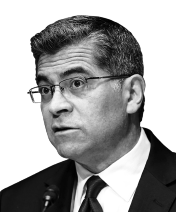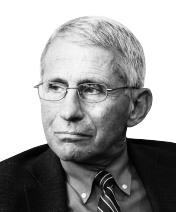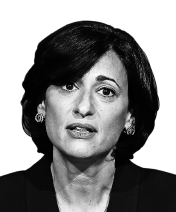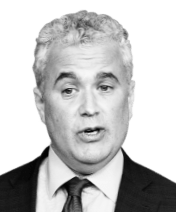
To access the Biden Power Map, sign up for FP Insider, a data-driven subscription service from Foreign Policy that gives professionals critical insights into the global issues impacting their business.
FP Insiders get full access to this and all Power Maps and Special Reports created by FP Analytics, Foreign Policy’s research division.
We work closely with organizations from all sectors to activate FP Insider access at scale—and at maximum savings. Learn more and request an FP Insider demo.
Pandemic Response
The Biden Power Players
UPDATED August 19, 2021-

Xavier Becerra
Secretary of Health and Human Services, U.S. Department of Health and Human Services
Relevance to the Biden Agenda:
As secretary of health and human services (HHS), Becerra is playing a central role in supporting the country’s COVID-19 vaccination efforts. Through the Public Readiness and Emergency Preparedness (PREP) Act, Becerra increased the vaccine workforce to allow other medical professionals, including medical and health students, to serve as vaccinators as the Biden administration surpassed its goal of 200 million vaccination within its first 100 days. HSS has established partnerships with over 40,000 retail pharmacies, and as of April 29, 2021, 90 percent of Americans lived within five miles of a vaccination site. One core component of HHS is its on-the-ground capability, with the Food and Drug Administration (FDA) overseeing vaccines and treatments, and the National Institution of Allergy and Infectious Disease (NIAID), led by Anthony Fauci, leading the underlying scientific and medical research. In April 2021, HHS launched the COVID-19 Community Corps, a program designed to recruit a grassroots network of trusted local voices to help encourage vaccination and accurately communicate health information.
Biography:
Becerra served as a Democratic member of Congress from California for over 20 years. In the House of Representatives, he served on the Ways and Means Subcommittee on Health, where he was an advocate for women’s health care rights. In 2017, Becerra was appointed as California’s attorney general, where he continued his advocacy for the protection of patients’ health care rights. During the government-imposed shutdown due to COVID-19, Becerra defended the state government’s legal authority to close businesses and religious sites, among other locations. Additionally, he worked to help undocumented immigrants access government services and legal assistance to fight deportation.
Points of Interest and Notable Connections:
Becerra’s key priority in response to COVID-19 is to ensure the safe and equitable rollout of vaccines, particularly to minority communities. Becerra has called for vaccines to be brought to citizens, particularly those located in rural areas to ease profound racial and ethnic disparities. In addition, Becerra has pointed to behavioral health problems, such as mental illness, addiction, and suicide, as concerning side effects of the pandemic following lockdown measures, which health experts note have disproportionately affected communities of color. Becerra is one of the new non-medical professionals on the COVID-19 task force, and public experts have expressed concerns that during a pandemic, someone with more medical or health care experience should lead HHS. However, others contend that as the attorney general (AG) of California, Becerra’s litigation background suggests that the health care industry will be held more accountable by the Biden administration and experience heavier regulation and enforcement from the federal government. In either case, Becerra faces numerous challenges as secretary, with academics and health experts pushing him and other COVID-19 leaders, such as Dr. Fauci and NIH director Dr. Francis Collins, to aggressively negotiate with American pharmaceutical companies for patent licensing terms that would speed vaccinations to the developing world. The majority of vaccine production is currently led by U.S. companies, and as low- and lower-middle income countries struggle to vaccinate their populations, critics are advocating for vaccine patent waivers to increase production and reduce vaccine prices in order to ease accessibility. In addition, while countries in the EU launch digital green certificates, concerns regarding data privacy and health care equity have presented hurdles to the effective planning of vaccine passports. Moreover, there are 17 passport initiatives underway, including those by the World Health Organization (WHO), leading to disparate, piecemeal attempts to organize and develop passports.
-
David Kessler
Chief Science Officer for Covid Response, U.S. Department of Health and Human Services
-
Dawn O'Connell
Senior Counselor for the COVID Response, U.S. Department of Health and Human Services
-
Andrea Palm
Deputy Secretary of Health and Human Services, U.S. Department of Health and Human Services
-
-

Elizabeth Cameron
Senior Director for Global Health Security and Biodefense, National Security Council, Executive Office of the President
Relevance to the Biden Agenda:
The director for global health security and biodefense on the National Security Council (NSC) is responsible for monitoring global health risks, including disease outbreaks, and coordinating the federal government’s response to such risks. The position was originally established after the 2014 Ebola epidemic, but in 2018 the Trump administration dissolved the role to shrink the NSC staff and consolidate three directorate into one given the overlaps between arms control and nonproliferation, weapons of mass destruction terrorism, and global health and biodefense. In 2020, public health experts criticized the Trump administration’s decision to dissolve the directorate, claiming that it may have hampered the U.S.’ ability to respond to the COVID-19 pandemic. Cameron previously held the job in the Obama administration and stated that the Trump administration’s move to phase the position out “contributed to the federal government’s sluggish domestic response” to the pandemic.
Biography:
From 2013 through 2016, Cameron served as the director for countering biological threats on the National Security Council (NSC). During her time serving in the Obama administration, Cameron helped to establish the Global Health Security Agenda, an international coalition to address infectious diseases. In 2016, she transitioned to a role as the senior director for global health security and biodefense on the NSC and was part of the task force to address the Ebola outbreak. After Trump dissolved her position in 2018, Cameron worked as the senior director of the Nuclear Threat Initiative (NTI), where she pressed the Trump administration to enact a more comprehensive response to COVID-19. Prior to her work in the White House, Cameron served in senior positions at the Office of Cooperative Threat Reduction and at the Department of Defense (DOD), where she worked to secure and safeguard weapons of mass destruction in the former Soviet Union.
Points of Interest and Notable Connections:
Cameron views speed and government coordination as critical to an effective pandemic response to mitigate the number of lives lost, economic instability, and risks to national security. In 2016, she notably led the creation of a pandemic playbook, which intended to support the White House in bringing together “all sectors of the federal government so that all capabilities, expertise, and relevant science and technology could be brought to bear in anticipating needs, filling gaps, and avoiding single points of failure.” A vocal critic of President Trump, Cameron noted the former administration’s failure to adhere to the playbook, which the Trump team argued was because the plan was outdated and more relevant to the Ebola epidemic in the Democratic Republic of the Congo than to COVID-19. Cameron emphasizes that equitable vaccine distribution, especially in Africa, is critical to containing the spread of the pandemic. She has called for the U.S. to partner with the African Union to increase access to test kits and for the administration to coordinate with its allies and partners. Cameron has also stated that public health and the economy are “inextricably linked.” She will work alongside Treasury Secretary Janet Yellen to address the slow vaccine rollout in poor countries, a situation that she states could threaten the global economy. In addition to responding to the COVID-19 pandemic, Cameron will be leading the administration’s long-term initiatives to bolster the country’s supply chains, monitoring, biotechnology, and response mechanisms to effectively tackle the next emerging biological threat, particularly emerging infectious diseases.
-
Megan Frisk
Director for Biotechnology Risks and Biological Weapon Nonproliferation, National Security Council, Executive Office of the President
-
Mark Lucera
Director for Countering Biological Threats and Global Health Security, National Security Council, Executive Office of the President
-
-

Anthony Fauci
Director, National Institute of Allergy and Infectious Diseases, U.S. Department of Health and Human Services
Relevance to the Biden Agenda:
In partnership with Secretary of Health and Human Services Xavier Becerra and Centers for Disease Control and Prevention (CDC) Director Rochelle Walensky, Fauci is leading the country’s COVID-19 response, reprising similar roles he played during the HIV/AIDS and Ebola viruses, as the chief medical advisor to President Biden for COVID-19. Fauci is the country’s top infectious disease doctor, supervising medical research that seeks to prevent, diagnose, and treat infectious and emerging diseases at the National Institutes of Health’s National Institute of Allergy and Infectious Diseases (NIAID).
Biography:
Fauci has been the leader of the National Institute of Allergy and Infectious Diseases (NIAID) for nearly 40 years. Prior to the COVID-19 pandemic, Fauci was known for his HIV/AIDS research and his groundbreaking work on understanding human immune responses. Fauci’s work on HIV/AIDS therapies made him the fifth most cited scientific author in the world from 1981 through 1994, and he has turned down the opportunity to lead the National Institutes of Health on multiple occasions to continue his work at NIAID fighting infectious diseases. In addition to leading the federal response against HIV/AIDS and COVID-19, Fauci was in charge of the government’s responses to SARS, the 2009 swine flu pandemic, MERS, Ebola, and other diseases under six consecutive presidential administrations.
Points of Interest and Notable Connections:
Fauci identifies the key challenges facing the administration in its response to COVID-19 as being the limited vaccine distribution, the need for more early-acting treatments to cure severe infections, the lack of public health infrastructure for handling an outbreak of such proportions, the rise of misinformation surrounding vaccines and the virus, and the mutant strains of virus. Although the Biden administration is effectively administering vaccines domestically with an average of 3.3 million shots given per day, Fauci notes that even if the U.S. defeats COVID-19 with vaccines, the country risks reinfection from mutant strains from other countries that have not been as successful in vaccinating their populations. The variants demonstrate that COVID-19 inoculation is a global job with the ultimate endgame being a sustainable, universal COVID-19 vaccine that is accessible to the entire international community. In a speech to the United Nations, Fauci expressed support for a multilateral approach to global public health and the necessity for countries to work together to counter the erosion of major global health gains, including those in the areas of HIV/AIDS, food security, malaria, and epidemic preparedness. He specifically pointed to the World Health Organization (WHO), echoing sentiments by Secretary of State Antony Blinken that the U.S. will continue its commitment to the organization. Fauci has also called for a transparent and robust international investigation to learn about what happened during the early days of the pandemic so that the world may learn about how future pandemics can be stopped. The initiative comes on the heels of increasing criticisms of China’s and the WHO’s lack of transparency regarding how and where the spread of COVID-19 started.
-
Hugh Auchincloss
Principal Deputy Director, National Institute of Allergy and Infectious Diseases, U.S. Department of Health and Human Services
-
Gary Gibbons
Director, National Heart, Lung, and Blood Institute, U.S. Department of Health and Human Services
-
Eliseo Pérez-Stable
Director, National Institute on Minority Health and Health Disparities, U.S. Department of Health and Human Services
-
-

Rochelle Walensky
Director, Centers for Disease Control and Prevention, U.S. Department of Health and Human Services
Relevance to the Biden Agenda:
As director of the CDC, Walensky oversees the agency’s information collection about vaccines and offers recommendations about their distribution. The CDC notably does not play a role in developing vaccines but works closely with health departments and other partners to develop vaccine programs. Before reaching its 100th day in office, the Biden administration met its revised goal of 200 million doses administered, but it now faces challenges reaching the 15 to 20 percent of Americans who are hesitant about being vaccinated. With over 35 million COVID-19 cases in the U.S. and more than 600,000 deaths as of August 6, 2021, Walensky has taken charge of the U.S.’s response to the Delta variant upsurge, which now accounts for 93 percent of all new COVID-19 cases in the country. In addition to supporting domestic responses to COVID-19, the CDC provides crucial global response emergency risk management resources to other countries and vulnerable populations and fosters partner outreach to share technical experience and know-how and strengthen disease-surveillance systems needed to detect and respond to future outbreaks. Chief medical advisor to the president Anthony Fauci notes that the pandemic risks being drawn out longer should majority of the world not receive vaccines.
Biography:
Prior to her appointment as director of the Centers for Disease Control and Prevention, Walensky was the chief of infectious diseases at Massachusetts General Hospital. In that role, she sat on the Massachusetts COVID-19 Advisory Board and helped lead the state’s pandemic response. She chaired the Office of AIDS Research Advisory Council at the National Institutes of Health from 2013 through 2015, and her work on HIV/AIDS serves as the basis for her harm-reduction approach to infection control. Throughout her career, she has been a passionate advocate for addressing health disparities and equity in the health care system.
Points of Interest and Notable Connections:
As COVID-19 variants spread across the globe, Walensky will supervise the investment of $1.7 billion to expand the country’s ability to track variants and increase the genomic sequencing—the process by which COVID-19 DNA is decoded and potentially deadly mutations in the virus can be detected. According to the White House, the funds will be spent on sequencing the genomes of COVID-19 samples, creating new genomic epidemiology centers, and building a National Bioinformatics Infrastructure to unify how sequencing data is shared and analyzed. In April 2021, Walensky identified the B.1.1.7 variant, originally found in Britain, to be the most common strain of the virus in the U.S. and contributing to rising case counts. Currently, the CDC is sequencing 15,000 samples per week, which the CDC is seeking to increase to 25,000 through contracts with commercial labs. Along with universities, industry groups, and public health labs, the U.S. is only sequencing about 6 percent of positive COVID-19 samples. According to Walensky, increasing the number of samples sequenced will allow the U.S. government to perform additional testing to better understand the virulence, transmissibility, and potential impacts the variants have on testing, therapeutics, and vaccines. Walensky, alongside senior director for global health security and biodefense Beth Cameron, will focus on strengthening vulnerabilities in global health infrastructure, workforce, and domestic preparedness in calling for further investments in the public health system.
-
Suzi Connor
Chief Information Officer, Centers for Disease Control and Prevention, U.S. Department of Health and Human Services
-
Anne Schuchat
Principal Deputy Director, Centers for Disease Control and Prevention, U.S. Department of Health and Human Services
-
Dia Taylor
Chief Operating Officer (Acting), Centers for Disease Control and Prevention, U.S. Department of Health and Human Services
-
Mitchell Wolfe
Chief Medical Officer, Office of the Chief Medical Officer, U.S. Department of Health and Human Services
-
-

Jeffrey Zients
Coordinator of the COVID-19 Response and Counselor to the President, White House COVID-19 Response Team, Executive Office of the President
Relevance to the Biden Agenda:
As coordinator of the COVID-19 Response Team, Zients oversees the federal government’s initiatives to tackle the pandemic, such as deciding travel restrictions and managing the vaccine supply chain. He is responsible for coordinating government-wide efforts to reduce disparities in the response, and treatment of COVID-19, and to support the safe re-opening and operation of schools and child-care providers, which the administration has pointed to as a key domestic goal within its first 100 days. Notably, in his newly established role, Zients has the authority to convene relevant agencies on matters involving domestic and global COVID-19 responses.
Biography:
Zients served in numerous roles in the Obama administration, including stints as the first U.S. chief performance officer (CPO) from 2009 to 2012. As acting director of the office of management and budget from 2012 to 2013, he oversaw the redesign of Healthcare.gov after the website’s failed initial launch. Following the website’s successful revamp, Zients joined President Obama’s National Economic Council, serving as its director from 2014 to 2017, and later served on both the White House Cancer Moonshot Task Force and the board of directors for the Biden Cancer Initiative.
Points of Interest and Notable Connections:
Unlike most of the COVID-19 task force, Zients notably does not have a medical or military background, but he is known for his ability to manage large and complex initiatives. His experience, both within the Obama administration (specifically, the National Economic Council) and in the private sector, positions him to operate at the nexus of public-private partnerships to effectively manage the various stakeholders involved in the pandemic response. Some health care professionals have criticized Zients’s appointment, stating that his work with The Advisory Board Company and private investments in the health care industry will make him reluctant to invoke the Defense Production Act to force companies to make needed supplies. However, others have asserted that the administration needs someone to orchestrate the various initiatives taking place, adding that Zients’s experience in the private sector provides him a unique perspective to understand and support businesses hurt by the pandemic. Tackling vaccine allocations across the U.S. and the economic impact of COVID-19 are Zients’s top priorities. In particular, he has pointed to the necessity for the federal government to reimburse states for expenses related to the pandemic before President Biden assumed office as well as to bolster partnerships with pharmacies to increase equitable vaccine access. Zients notably supported discussions between Johnson & Johnson and Merck to expand vaccine capacity and address production failures. Abroad, Zients is supporting international efforts, pointing to India as an example of what could happen if inoculation initiatives and vaccine access are not expanded. In April 2021, Zients committed the U.S. to sharing vaccine supply and promised to explore what options are available.
-
Charles Anderson
Director of Economic Policy and Budget, White House COVID-19 Response Team, Executive Office of the President
-
Bechara Choucair
Vaccinations Coordinator, White House COVID-19 Response Team, Executive Office of the President
-
Diedra Henry-Spires
Senior Advisor for COVID Programs, Office of the Administrator, U.S. Small Business Administration
-
Carole Johnson
Testing Coordinator, White House COVID-19 Response Team, Executive Office of the President
-
Natalie Quillian
Deputy Coordinator of the COVID-19 Response, White House COVID-19 Response Team, Executive Office of the President
-
Eugene Sperling
Coordinator of the COVID-19 Relief Plan, White House COVID-19 Response Team, Executive Office of the President
-
-
Angeli Achrekar
Global AIDS Coordinator and U.S. Special Representative for Global Health Diplomacy (Acting), Office of the U.S. Global AIDS Coordinator and Health Diplomacy, U.S. State Department
Achrekar rose in the ranks of the Office of Global AIDS Coordinator, first joining in 2014. Prior to her work at the Department of State, Achrekar worked at the Centers for Disease Control and Prevention’s (CDC) Division of Global HIV/AIDS. She served as the senior public health manager in the CDC’s office in South Africa.
-
Lloyd Austin
Secretary of Defense, U.S. Department of Defense
Austin will coordinate aid shipments to India across U.S. agencies and is overseeing the domestic military deployments to aid with COVID-19 vaccinations. Read more about Austin’s role in the Biden administration here.
-
Antony Blinken
Secretary of State, U.S. Department of State
Blinken will help lead the U.S.’s global inoculation efforts alongside Samantha Power and Linda Thomas-Greenfield. In April 2021, he called on the World Health Organization (WHO) to investigate the origins of COVID-19, citing a lack of transparency and cooperation from China. Read more about Blinken’s role in Biden the administration here.
-
Eric Carlson
Director, Office of the International Health and Biodefense, U.S. State Department
Carlson will lead the Department of State’s diplomatic efforts to address international health and biodefense crises. He will coordinate his work with international governments, the private sector, and civil society to prevent the global spread of infectious disease, including boosting the U.S.’s international efforts to fight COVID-19.
-
Eric Lander
Presidential Science Advisor, Office of Science and Technology Policy, Executive Office of the President
Lander was the founding director of the Broad Institute of MIT and Harvard University, a leading scientific research facility. He is a geneticist and mathematician by training and co-chaired former President Obama’s Council of Advisors on Science and Technology (PCAST). One of Lander’s goals will be to establish greater response capabilities for future pandemics.
-
David Marchick
Chief Operating Officer, U.S. International Development Finance Corporation
At the U.S. International Development Finance Corporation (DFC), Marchick is overseeing the distribution of billions of dollars, primarily to developing nations, to fund locally manufactured COVID-19 vaccines. Aid locations include COVID-19 hotspots in sub-Saharan Africa, like Senegal and South Africa, and South America. Significant financial support has gone toward boosting Johnson & Johnson vaccine production in Africa, as Marchick works towards counteracting China’s vaccine dominance in the region.
-
Alejandro Mayorkas
Secretary of Homeland Security, U.S. Department of Homeland Security
-
Vivek Murthy
Surgeon General, Office of the Assistant Secretary of Health, U.S. Department of Health and Human Services
From 2014 to 2017, Murthy served as the U.S. surgeon general. In that role, he took a number of controversial positions, including highlighting climate change’s negative health effects, opposing so-called LGBT conversion therapy, and calling the gun violence epidemic a health issue. With Marcella Nunez-Smith, Murthy co-chaired President-Elect Biden’s COVID-19 Advisory Board.
-
Marcella Nunez-Smith
Chair, COVID-19 Health Equity Task Force, Office of Minority Health, U.S. Department of Health and Human Services
Nunez-Smith is the founding director of the Equity Research and Innovation Center at the Yale School of Medicine. In 2020, she was a member of the Connecticut taskforce charged with recommending reopening procedures following the state’s COVID-19 shutdown. She chaired the advisory group’s subcommittee on community. Nunez-Smith also co-chaired President-Elect Biden’s COVID-19 Advisory Board after the presidential election, along with Vivek Murthy.
-
Jerome Powell
Chair, Board of Governors of the Federal Reserve System, Federal Reserve System
Powell’s term as chair of the Federal Reserve precedes the Biden administration, having succeeded Janet Yellen in 2018. He helmed the Fed throughout the COVID-19 crisis, implementing unprecedented market-stabilization efforts in 2020 by pumping $2.9 trillion into the U.S. economy within three months. This, in part, grew the Fed’s balance sheet to an astonishing 40 percent of the total U.S. economy, eclipsing the extent of his predecessors response to the 2008 financial crisis. Read more about Powell’s role in the Biden administration here.
-
Samantha Power
Administrator, U.S. Agency for International Development
While serving in the Obama administration as a member of the National Security Council (NSC) and later as U.S. representative to the United Nations, Power argued for U.S. intervention abroad. During the COVID-19 crisis, she insisted that the U.S. lead the global effort to combat the virus, noting that the growth of globalization necessitates a collective response to such threats. She blamed the Trump administration for retreating from the world stage and allowing China to reap the subsequent benefits. Read more about Power’s role in the Biden administration here.
-
Gayle Smith
Coordinator for Global COVID-19 Response and Health Security, U.S. Department of State
Since 2017, Smith has served as president and CEO of ONE Campaign, a non-profit initiative to tackle disease and poverty in Africa. She had previously been the Administrator of USAID during the Obama administration. Under former President Clinton, Smith served as the NSC’s senior director for African Affairs, and under former President Obama, she was the national security council’s (NSC) senior director for development and democracy. Smith, along with USAID Administrator Samantha Power, will coordinate the U.S.’s distribution of COVID-19 vaccines to countries in need as well as to U.S. allies.
-
Jake Sullivan
White House National Security Advisor, National Security Council, Executive Office of the President
Sullivan reorganized the National Security Council (NSC) to make public health a permanent priority and created the position of senior director for global health security and biodefense, now filled by Elizabeth Cameron. Cameron will work under Sullivan to combat the spread of contagious diseases and biological contaminants. Read more about Sullivan’s role in the Biden administration here.
-
Katherine Tai
U.S. Trade Representative, Office of the U.S. Trade Representative, Executive Office of the President
Tai’s role oversees U.S. international patent protections, making her critical to exporting U.S. COVID-19 vaccines globally. She has called the global vaccine disparity “completely unacceptable” and announced the U.S.’s intent to support a patent waiver for the COVID-19 vaccines in May 2021. Tai will now work with the World Trade Organization to waive vaccine patent protections and distribute the raw materials to countries in need. Read more about Tai’s role in the Biden administration here.
-
Linda Thomas-Greenfield
U.S. Ambassador to the United Nations, U.S. Mission to the United Nations, U.S. Department of State
Thomas-Greenfield encouraged the U.S. and the international community to provide debt relief and ease international financial restrictions in response to the pandemic, pointing to its disparate impacts globally. She also called on China to increase its international aid, particularly in Africa, where the economic fallout from the pandemic has been especially acute. Read more about Thomas-Greenfield’s role in the Biden administration here.
-
Janet Yellen
Secretary of the Treasury, U.S. Department of the Treasury
At the onset of the COVID-19 pandemic, Yellen argued for extraordinary fiscal support from the government to buttress the Fed’s economic relief measures. She contended that the U.S.’s response to the 2008 financial crisis was ineffective and that economic policymakers should not use the same gradualist approach as they did in 2008. As Secretary of the Treasury, Yellen will be in part responsible for executing the aggressive fiscal spending measures the Biden administration has proposed. Read more about Yellen’s role in the Biden administration here.
Read the Full Policy Priority Briefing ➞
The Biden Plan to Beat COVID-19
Key challenges:
- Wealthier countries’ early moves to lock up vaccine supply exacerbating global health inequities.
- COVID-19 vaccination supply chain straining under heightened demand.
- Disinformation sowing mistrust in science and contributing to vaccine hesitancy.

